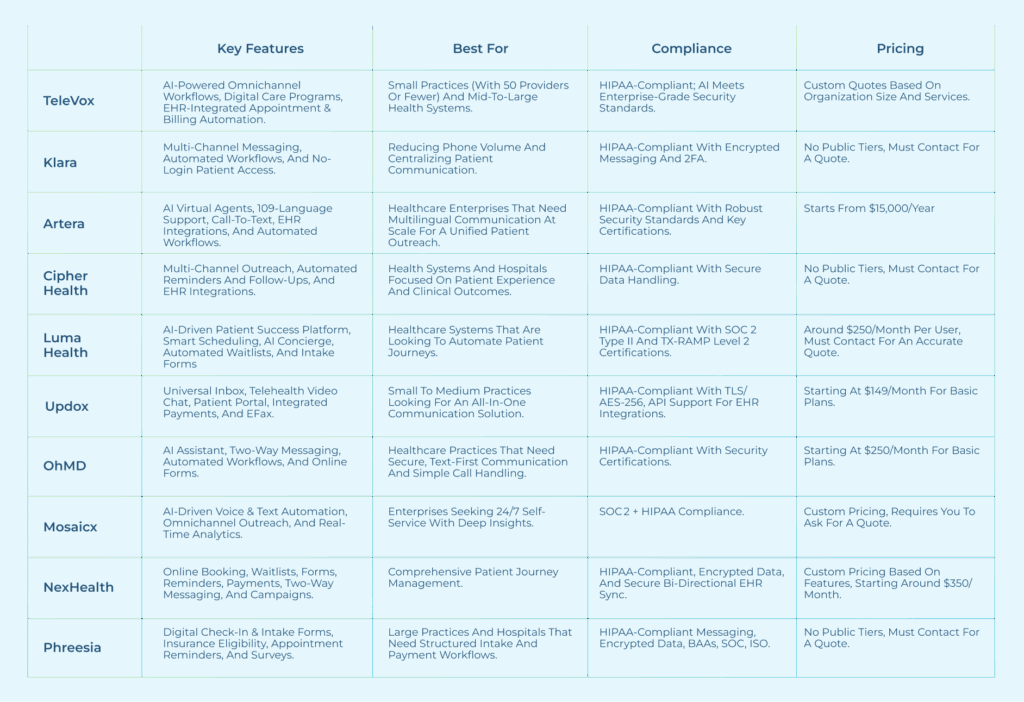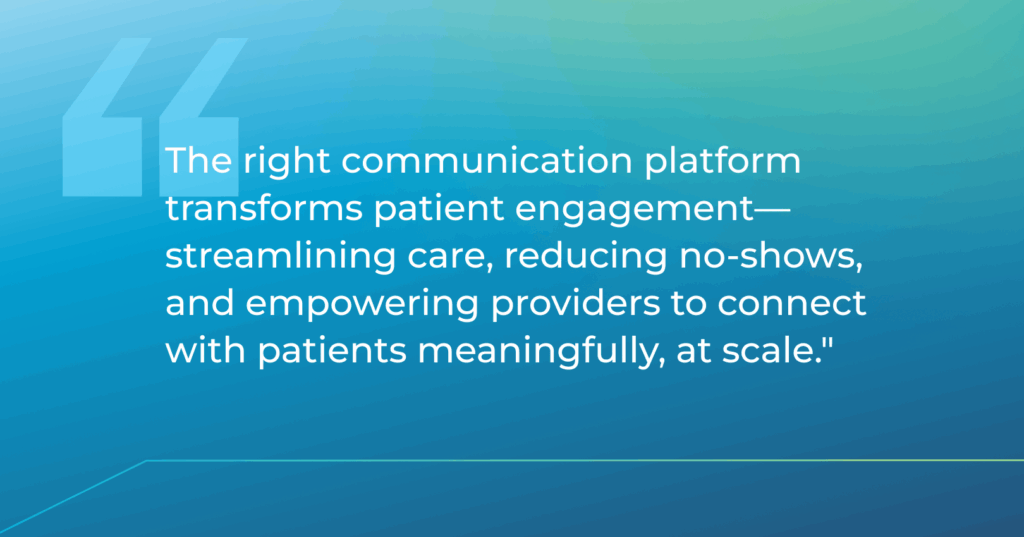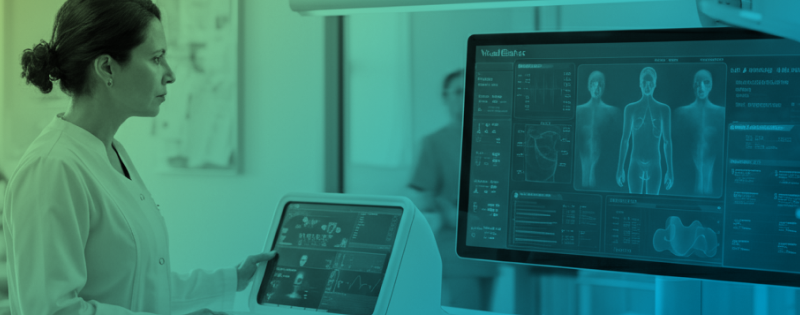Healthcare providers can’t afford to miss a patient’s call. That one unanswered ring could mean…

10 Best Patient Communication Platforms for Healthcare
The way healthcare teams communicate has drastically changed. Your patients now expect fast, clear answers for every interaction. These demands make patient communication platforms highly important for healthcare organizations.
The right tools here are not just convenient, but also essential patient communication solutions that help providers stay organized, reduce no-shows, and keep patients updated without overwhelming the front desk.
That said, not all platforms are built the same. Below are 10 of the best patient communication platforms on the market. See for yourself what makes them stand out.

1. TeleVox
| Key Features | Best For | Compliance | Pricing |
| AI-powered omnichannel workflows, digital care programs, EHR-integrated appointment & billing automation. | Small practices (with 50 providers or fewer) and mid‑to‑large health systems. | HIPAA-compliant; AI meets enterprise-grade security standards. | Custom quotes based on organization size and services. |
TeleVox has been doing patient communication longer than most. They’ve got over 30 years of experience and work with more than 7,000 healthcare organizations.
TeleVox strives to ensure care continuity and a better patient experience throughout the entire care journey. Their unified platform brings together everything from omnichannel messaging (inbound and outbound) to appointment automation, care programs, and more.
Their self-service solution, SMART Agent, lets patients have AI-powered conversational communication through text, voice calls, web chat, or email to handle appointments, prescription refills, deal with billing, or answer patient inquiries so that your staff doesn’t have to.
What puts TeleVox at the top is that it actually works at scale. When you’ve got thousands of patients to manage, you need something that won’t crash or slow down. Patients can take care of most things themselves without calling your office, which means fewer no-shows and less work for your staff.
It’s the kind of system that pays for itself by making everything run smoother, especially with how it integrates with the EHR to support automated, personalized, two-way interactions with patients. It’s why so many healthcare organizations stick with it.
2. Klara
| Key Features | Best For | Compliance | Pricing |
| Multi-channel messaging, automated workflows, and no-login patient access. | Reducing phone volume and centralizing patient communication. | HIPAA-compliant with encrypted messaging and 2FA. | No public tiers, must contact for a quote. |
Klara centralizes communication channels and automates outreach workflows to help practices focus on patient outcomes. The platform enables patients to send text messages, use webchat, and convert calls into secure messages without requiring passwords, logins, or downloads.
Its voice-to-text transcription allows practices to get important details from calls quickly, and it integrates with over 50 EHR and PM systems.
However, some users find EMR integration challenging during setup. Additionally, small teams may end up overspending since pricing lacks transparency.
3. Artera
| Key Features | Best For | Compliance | Pricing |
| AI virtual agents, 109-language support, call-to-text, EHR integrations, and automated workflows. | Healthcare enterprises that need multilingual communication at scale for a unified patient outreach. | HIPAA-compliant with robust security standards and key certifications. | Starts from $15,000/year |
Artera serves over 900 healthcare organizations with AI-powered virtual agents that handle voice and text communications. The platform supports 109 languages and includes Staff AI Co-Pilot to help administrative teams respond faster to patient inquiries.
Its Harmony platform combines self-scheduling, digital intake, and billing into one communication thread. The system integrates with EHRs and offers automated workflows and community outreach.
However, initial implementation has a learning curve and may prove complex for some users. Others note that appointment cancellations sometimes don’t sync cleanly with EHRs.
4. Cipher Health
| Key Features | Best For | Compliance | Pricing |
| Multi-channel outreach, automated reminders and follow-ups, and EHR integrations. | Health systems and hospitals focused on patient experience and clinical outcomes. | HIPAA-compliant with secure data handling. | No public tiers, must contact for a quote. |
Cipher Health offers automated outreach via calls, texts, and emails. It provides multilingual secure messaging, patient surveys, reminders, analytics, and integrates with major EHRs.
The company has built quite a reach, connecting with nearly 2.5% of Americans through their various programs. Their system handles everything from post-discharge check-ins to appointment scheduling, and implementation typically takes just a few days.
However, users often find the workflow and reporting options somewhat rigid, with limited customization available. The platform’s navigation can also feel confusing for some users, particularly during initial setup.
5. Luma Health
| Key Features | Best For | Compliance | Pricing |
| AI-driven Patient Success Platform, smart scheduling, AI concierge, automated waitlists, and intake forms. | Healthcare systems that are looking to automate patient journeys. | HIPAA-compliant with SOC 2 Type II and TX-RAMP Level 2 certifications. | Around $250/month per user, must contact for an accurate quote. |
Luma Health designed its platform on one basic idea: patients should be able to schedule wherever they are. Whether they find you on Google or text your office, they can book immediately.
The platform frees up your staff by automatically managing mundane tasks, such as waitlists, reminders, forms, and insurance checks.
What stands out about Luma is that it can integrate with nearly any healthcare system. But with all those features crammed in, it does take a little getting used to.
6. Updox
| Key Features | Best For | Compliance | Pricing |
| Universal inbox, telehealth video chat, patient portal, integrated payments, and eFax. | Small to medium practices looking for an all-in-one communication solution. | HIPAA‑compliant with TLS/AES‑256, API support for EHR integrations. | Starting at $149/month for basic plans. |
Updox is an excellent patient communication solution that bundles telehealth, secure messaging, reminders, forms, broadcasts, eFax, and payment support into one inbox, which means you don’t need to learn new software or ask patients to download apps.
Their telehealth feature lets you see patients virtually using computers you already have, and the integrated payment system makes it easy for patients to pay bills right from their phones.
Updox also handles documents. You can sign, edit, and share files from a single screen. However, some users find the interface feels dated compared to newer platforms. Also, regarding the telehealth feature, video sessions may drop or lag.
7. OhMD
| Key Features | Best For | Compliance | Pricing |
| AI assistant, two-way messaging, automated workflows, and online forms. | Healthcare practices that need secure, text-first communication and simple call handling. | HIPAA-compliant with security certifications. | Starting at $250/month for basic plans. |
OhMD delivers texts, web chat, calls, forms, video, reminders, and broadcasts all within one inbox. It turns your current phone into a secure messaging hub, using its AI assistant (Nia) to reduce call volume. Nia answers routine patient calls and routes complex ones to staff. It helps practices manage inbound communication without extra hires.
This patient communication platform syncs with over 85 EHRs while enforcing HIPAA and other key security details.
OhMD is said to also have a little learning curve during setup, but its main limitation is the exclusion of certain features like advanced automation, even with the basic plan.
8. Mosaicx
| Key Features | Best For | Compliance | Pricing |
| AI-driven voice & text automation, omnichannel outreach, and real-time analytics. | Enterprises seeking 24/7 self-service with deep insights. | SOC 2 + HIPAA compliance. | Custom pricing, requires you to ask for a quote. |
Mosaicx made our list because it does something most patient communication platforms don’t. It actually talks to patients via conversational AI like a real person would.
Instead of basic text messages back and forth, patients can have full conversations through voice or chat to book appointments, check on prescriptions, or figure out billing issues. And it works around the clock, so your staff doesn’t have to.
What sets Mosaicx apart is how fast you can get it running and how well it fits into what you’re already doing. The setup doesn’t drag on for months, it connects with your existing systems without breaking anything, and you get detailed reports on how patients are using it.
Plus, they built the whole thing with healthcare security in mind, so you don’t have to worry about compliance issues when you start automating more of your patient interactions.
9. NexHealth
| Key Features | Best For | Compliance | Pricing |
| Online booking, waitlists, forms, reminders, payments, two-way messaging, and campaigns. | Comprehensive patient journey management. | HIPAA-compliant, encrypted data, and secure bi-directional EHR sync. | Custom pricing based on features, starting around $350/month. |
NexHealth brings patient communication tools together: online booking, reminders, forms, payments, messaging, and review campaigns, all synced with your EHR via its real-time Synchronizer.
Recent updates include iOS messaging, AI quick replies, two-factor authentication, kiosk check-in, and insurance verification. It builds efficiency and cuts no-shows while keeping everything secure under HIPAA and encrypted BAAs.
Pricing runs on the higher side, and setup isn’t always straightforward. Some users say booking options feel limited, and there can be hiccups with reminders or form syncing.
10. Phreesia
| Key Features | Best For | Compliance | Pricing |
| Digital check‑in & intake forms, insurance eligibility, appointment reminders, and surveys. | Large practices and hospitals that need structured intake and payment workflows. | HIPAA‑compliant messaging, encrypted data, BAAs, SOC, ISO. | No public tiers, must contact for a quote. |
Phreesia stands out as a prominent healthcare communication system for how well it handles the intake process. Patients are able to check in, confirm insurance, pay, complete forms, and answer surveys all before they’re even in the clinic.
The communications platform is designed for fast-paced practices that want to cut down on paperwork at the front desk. It all flows through a secure, HIPAA-compliant system, and it’s utilized by some of the largest health networks.
That said, it’s not the most flexible platform. Workflows are fairly locked in, and reminders are tied strictly to appointments. Some clinics need IT help to connect them with their EHR, and patients may get overwhelmed by the number of texts or messages they receive.
How to Choose the Right Patient Communication Solution for Your Needs
Finding the right patient communication platform can make or break how your practice runs. You need something that keeps patient data secure while actually making your team’s job easier. Here’s what to focus on when you’re shopping around for solutions:
- HIPAA compliance: Security is never optional. Make sure the platform encrypts messages, tracks who accessed what, and has a solid plan for data breaches. Remember to ask to see their compliance certificates.
- Works on phones: Most patients will use this on their phone. They won’t use it if the mobile experience is clunky.
- Multiple ways to communicate: Some patients prefer texts, others want emails, or phone calls. Pick a platform that handles all these channels so patients can reach you how they want.
- Reliable customer support: You need help right away when something breaks. Check what kind of support comes with your plan.
- Can grow with your practice: Don’t pick something you’ll outgrow in six months. Make sure you can add more users or locations without starting over.
- Collects patient feedback: You need to know if patients are happy with how you communicate. Built-in surveys and ratings help you stay on top of this.
Key Features to Look for in a Patient Communication Software
The best patient communication platforms go beyond just sending reminders or texts. You need something that actually makes your practice run better while keeping patients engaged.
Multiple Communication Channels That Work Together
Your patients don’t all communicate the same way. Some prefer texts, others want phone calls or emails. The platform should handle all of these and let patients respond back through whatever channel they used.
For example, TeleVox’s SMART SMS and voice tools let patients book appointments or ask questions right within the same message thread, so there’s no jumping between different systems.
Connects Smoothly With Your EHR
If you’re entering patient information twice, you’re wasting time and creating opportunities for mistakes. The communication platform should pull data directly from your existing EHR system and update it automatically.
TeleVox’s built-in integrations handle scheduling, reminders, and billing messages without anyone on your staff having to touch them.
Smart Automation That Learns
Basic scheduled messages are fine, but smart automation is better. Look for systems that figure out the best time to contact each patient and which method works best for them.
TeleVox uses AI to adjust when and how it reaches out based on how patients have responded before, so you’re not bothering people at bad times.
Scalable Digital Care Programs
Your communication tool should grow with your practice. TeleVox offers pre-built and customizable care programs, allowing healthcare organizations to deliver ongoing support without overburdening staff.

Why TeleVox Is the Best Choice for Healthcare Communication Needs
If you’re tired of chasing patients with endless calls, emails, and sticky notes, it’s time for a better way. TeleVox does a lot more than just help you send messages in bulk and on time. It handles the whole conversation.
From filling no-show slots to checking in on chronic care patients, it works quietly in the background so your staff doesn’t have to. As for the patients, they actually respond because you’re making the whole process fast, easy, and personalized.
Want to see how it works in real time? Book a demo and we’ll show you what stress-free patient communication really looks like.



